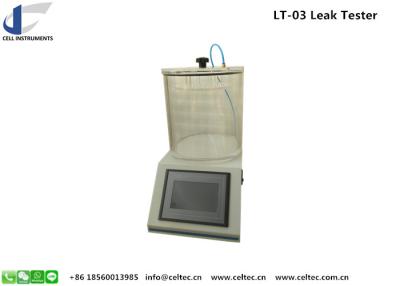Packaging
Minor
Leak
Testing
Nondestructive
Leak
Detection
Instrument
ASTM
F2338
Leak
Tester
For
Sealed
Micro
Packaging
![]()
Introducing
the
MLT-01
ASTM
F2338
Leak
Tester
for
Micro
Leak
Detection
The
MLT-01
ASTM
F2338
Leak
Tester
is
an
advanced
testing
instrument
engineered
by
Cell
Instruments
to
provide
precise,
non-destructive
leak
testing
for
sealed
micro-packaging.
Using
the
Vacuum
Decay
Method,
it
identifies
and
quantifies
micro
leaks
in
nonporous,
rigid,
and
flexible
packages,
meeting
industry
standards
such
as
ASTM
F2338.
With
this
state-of-the-art
leak
tester,
businesses
in
packaging,
food,
pharmaceuticals,
and
more
can
ensure
their
packaging
quality
is
optimal
and
compliant.
|
Test
Range
|
1Pa
|
|
Sensitivity
|
1~3μm
|
|
Chamber
size
|
Made-On-Demand
|
|
Vacuum
pump
|
to
be
prepared
by
user
|
|
Power
Supply
|
AC
110~220V
50Hz
|
Key
Features
of
ASTM
F2338
Leak
Tester
for
Non-Destructive
Testing
The
ASTM
F2338
Leak
Tester
is
designed
with
features
that
set
it
apart
in
the
field
of
leak
detection,
providing
unparalleled
sensitivity
and
accuracy.
Here’s
a
detailed
look
at
what
makes
the
ASTM
F2338
Leak
Tester
indispensable:
-
Precision
Leak
Detection:
The
MLT-01
detects
leaks
as
small
as
1-3μm,
allowing
for
accurate
detection
of
micro
leaks
in
both
rigid
and
flexible
packaging.
This
high
sensitivity
is
crucial
for
maintaining
package
integrity
across
industries.
-
Vacuum
Decay
Method:
This
method
is
a
non-destructive,
reliable
testing
approach
that
offers
consistent
and
accurate
results,
aligning
with
ASTM
F2338
standards.
-
Customized
Chamber
Sizes:
The
ASTM
F2338
Leak
Tester
accommodates
a
wide
range
of
package
sizes
through
tailor-made
chambers,
maximizing
versatility
and
adaptability
for
different
products.
-
User-Friendly
Interface:
An
intuitive
HMI
and
a
PLC-based
control
system
streamline
operations,
enhancing
ease
of
use
and
productivity.
-
Compliance
with
ASTM
F2338
Standards:
Ensuring
industry-standard
compliance,
the
MLT-01
provides
dependable
testing
for
quality
assurance.
Why
Use
the
ASTM
F2338
Leak
Tester?
Ensuring
package
integrity
is
essential
for
preserving
product
quality
and
safety.
By
implementing
the
ASTM
F2338
Leak
Tester,
manufacturers
benefit
from
a
robust
quality
control
process
that
detects
potential
leaks
before
products
reach
customers,
preventing
contamination,
spoilage,
and
compromised
safety.
The
MLT-01
Leak
Tester
offers
several
advantages:
-
Non-Destructive
Testing:
No
need
to
open
or
alter
the
packaging
during
testing,
preserving
product
quality
while
performing
leak
tests.
-
Broad
Industry
Application:
The
ASTM
F2338
Leak
Tester
is
ideal
for
sectors
such
as
food,
pharmaceuticals,
and
textiles,
making
it
a
universal
tool
for
micro-leak
detection.
Application
Areas
for
ASTM
F2338
Leak
Tester
The
ASTM
F2338
Leak
Tester
supports
diverse
packaging
applications,
maintaining
quality
standards
across
various
industries:
-
Plastic
Packaging:
Critical
for
protecting
plastic-packed
goods
from
contamination.
-
Paper
and
Cardboard
Packaging:
Ensures
leak-free
packaging
for
consumer
goods.
-
Textile
Industry:
Assures
packaging
integrity
in
protective
wraps
and
covers.
-
Food
Packaging:
Prevents
leaks
that
can
lead
to
spoilage
or
contamination.
-
Pharmaceutical
Packaging:
Meets
stringent
safety
regulations,
ensuring
secure
packaging.
-
Toiletry
and
Personal
Care:
Maintains
product
integrity
by
avoiding
leaks
in
toiletry
packaging.
-
Printing
and
Adhesive
Applications:
Guarantees
stability
in
printed
and
adhesive
materials
used
in
packaging.
Technical
Parameters
of
ASTM
F2338
Leak
Tester
MLT-01
-
Test
Range:
Up
to
1Pa
for
accurate
leak
detection
-
Sensitivity:
Capable
of
detecting
leaks
in
the
range
of
1-3μm
-
Chamber
Customization:
Available
to
suit
various
packaging
sizes
Advantages
of
ASTM
F2338
Leak
Tester
in
Packaging
Quality
Assurance
The
ASTM
F2338
Leak
Tester
offers
several
strategic
advantages:
-
Ensures
Compliance:
Adheres
to
industry
standards
for
reliable,
recognized
testing
outcomes.
-
Increases
Safety
and
Product
Longevity:
Leak
detection
protects
from
product
spoilage,
contamination,
and
other
quality
issues.
-
Enhances
Quality
Control
Processes:
Helps
to
identify
defects
early
in
the
production
line,
streamlining
packaging
quality
checks.
![]()










